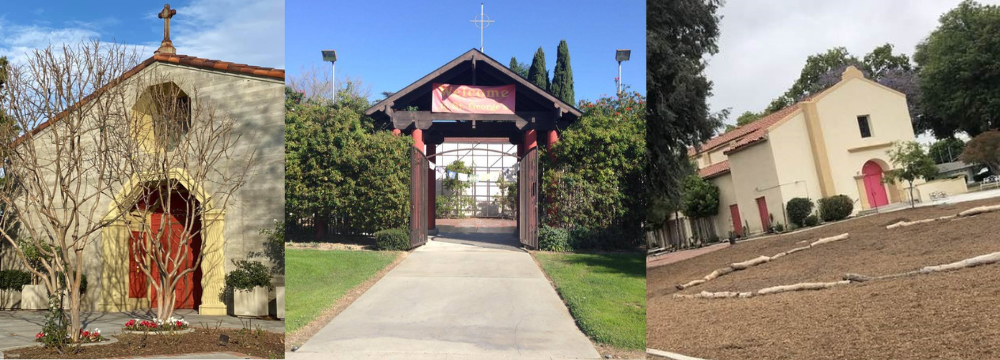
Riverside’s three Episcopal churches – (from left) All Saints, St. George’s, and St. Michael’s Ministry Center – stand ready to share in climate resiliency project.
[The Episcopal News – December 3, 2024] The Episcopal Diocese of Los Angeles, in collaboration with the Dr. Lucy Jones Center for Science and Society, has submitted a grant proposal to fund the creation of a series of “resiliency hubs,” the basis of an eventual resiliency collaborative, in Riverside County.
The hubs would provide tangible support and shelter to vulnerable communities and community members in the face of environmental dangers including heatwaves, wildfires, flooding, and earthquakes, while attempting to combating broader climate change issues in the community.
The program would begin with the development of initial resilience hubs at three Episcopal churches in the city of Riverside: All Saints (3847 Terracina Drive), St. George’s (950 Spruce Street), and St. Michael’s Ministry Center (4070 Jackson Street).
The development of the initial sites would include the instillation of shade structures and solar panels, the creation of produce gardens, replacement of HVAC systems to filter the air, and seismic retrofitting, to make the buildings safe in case of an earthquake.
These developments would ensure that the sites can serve as shelters and safe locations with power and clean air during wildfires, heatwaves, power outages, earthquakes, and other environmental threats in Riverside county.
The hubs also would provide regular produce distributions and community health classes, on topics such as healthy cooking and indoor air quality. Within the three-year grant period, the program would aim to engage at least 10 other local organizations to engage in the resilience collaborative.
The application is for a $11.24 million grant from the Environmental and Climate Justice Community Change Grants Program from the U.S. Environmental Protection Agency. The grant program focuses on resiliency in and recovery after climate disasters and ongoing climate crisis, especially in disadvantaged and at-risk areas.
Residents of Riverside county face above-average climate related health and safety challenges, including high levels of smog and air pollution, dangerous heat, and wildfires. Riverside County has been ranked one of the worst counties for smog in the nation by the American Lung Association, and experienced 72 separate wildfires in 2024 alone.
Riverside’s proximity to the San Andreas and Elsinore fault lines, as well as the San Jacinto Fault Zone, put the area in further potential risk. In addition, Riverside is the only city in Southern California to have only one connection at 69kV to the statewide power grid. If that one connection to the grid goes down, Riverside will have a serious and lengthy power outage. The resiliency hub proposal aims to create safe options for residents in times of environmental crisis.
The Riverside resiliency hub proposal grows out of several initiatives already in place and underway at the three churches and in the diocese, and will expand and further fund these efforts. St. Michael’s recently opened affordable housing development on their property, has already received some funding from a separate grant to develop their community garden, and has a hot meals program and food pantry currently running. All Saints Church has made a wide variety of upgrades to their campus and are in the final stages of permitting for a 3,200-square-foot solar panel installation. They also have a food pantry and produce distribution program. St. George’s church is planning an affordable housing development on their campus and is in discussions with local developers.
The initial sites are in good positions to take on the new responsibilities, and the project will be guided by experienced partners. The Diocese of Los Angeles has provided nonsectarian community social services across six Southern California counties for more than 120 years, serving the most vulnerable communities including immigrants and refugees, low-income and minority households, people experiencing homelessness, seniors, children, youth, and those facing food insecurity.
The Dr. Lucy Jones Center for Science and Society, founded in 2016 by Dr. Lucy Jones after her more than three decades of public service as a seismologist with the US Geological Survey, has extensive experience in line with its mission to activate the use of science in the creation of more resilient communities. The Center’s Connected Communities program was developed to bring community-based organizations together with local governments to be better prepared for earthquakes and has been implemented by the Center in three cities in Southern California.
Seeds of Hope, the food-justice mission of the diocese and another partner in the project, is specialized in creating and managing gardens and produce distributions, running gardening and healthy eating classes, and setting up new distribution programs.
With climate-fueled natural disasters becoming worse and more frequent, measures to combat climate change and build community resilience are often one in the same, the grant proposal says. By their nature, the proposed projects – solar panels, EV charging stations, and community gardens – address factors of vulnerability while also advancing the goals of fighting climate change and reducing pollution.
By creating hubs based at local community institutions, such as the three churches that will serve as the initial sites, the program hopes to engage and involve residents and local institutions in the collaborative, keeping the community and community needs as the central focus at all times. By the end of the three-year grant, the Riverside resiliency project would be a sustainable collaborative, with ongoing funding streams and communal leadership and input, of and for the people of Riverside.
